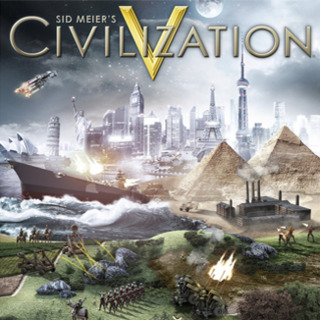Without a doubt, Civ is back! However, some changes and omissions may irritate some die-hard fans.
For those of you new to the Civ series, Civ 5 is a turn-based strategy game that takes a group of settlers from 4000BC to 2050AD. Over the course of 500 turns, you attempt to achieve one of 4 (technically 5) victory conditions. They are, domination, culture, diplomacy, and science. You can also win by getting to turn 500 and having more points than any other competing Civ, but I wouldn't call that a victory condition... More like victory by default.
Those of you with Civ experience will feel more or less at home. You still start the same way -- You get one Settler, one military unit, and a map that's covered by a fog that can only be removed by exploration. There's still a tech tree with a (mostly) logical progression. You still win the game by establishing cities, ans using those cities to build military units, structures, and wonders. You then use these to help you win the game. You also still need to contend with competing Civs, which can become allies or enemies.
However, there are a few notable changes this go around. I can't go into them all, but I will talk about the ones I feel are most significant.
First, the game has been switched from maps built of squares to hexes. I think this is a great idea, and has been long overdue. The world map feels more organic this way. You might think this makes the game more advanced, but I think it makes it simpler. Even though previous games used squares, they behaved more like octagons by allowing you to move NSEW, as well as diagonally. That gives your cities 8 angles of defense and attack. Now you have only 6 to worry about.
Second, you can no longer stack units. This was a staple of the series until now, but is also a change for the better. You can no longer overwhelm your opponent by moving 30 units into a single square and hammering them repeatedly. Now you need to consider how many units you're willing to take, and how to place each one for an attack or defense. In other words, you actually get to use some strategy!
Third, "Happiness" (the soft-cap mechanism formerly used to cap the size of your cities) no longer operates on a per-city basis. It now operates as one pool towards your entire civilization. I find this works better, because the game is about the Civilization itself, not just each city working of themselves. This makes your Civ feel like one big machine, not a bunch of little parts.
Fourth, "Civics" have been replaced with "Policies". Civics formerly represented styles of government. You could not change Civics without entering a state of anarchy. This was meant to simulate a revolution where one type of government is replaced by another. Now, Policies are almost like a specialization which stays with you throughout the game. Again, this is another change that I welcome because it makes the game-play feel fresh.
Fifth, you can no longer move land units into a water based cargo or transport unit. You now load land units directly into the water, then escort them (should you choose) via specialized water units. I have mixed feelings about this, because it's now much harder to wage war via the sea. Yes, you don't have to build an escort, but your land units are almost completely defenseless on the water otherwise.
Now, to talk about some omissions.
First major omission -- no more espionage. I could care less about this. I never used espionage in any previous Civ game. It seemed to get in the way.
Second -- no more religion or corporations. These were introduced with Civ IV. Both of these provided a similar mechanic, where a piece of your Civ could spread around the world and would provide a source of income. Religion tented to apply to the early game, while corporations applied more to the late game. I suspect that Religion was too controversial, and that's why it was removed. Since the in-game function of corporations was almost identical to religions, they were removed too.
What I mentioned above only scratches the surface. The core things that make this a "Civ" game are still there, minus some minor changes/omissions. There are some serious arguments going on in fan-site message boards about the changes and omissions, but all of these were probably done to make the game more accessible. Did it make it easier? Yep, probably. But Civ IV was so complicated it had painting itself into a corner. We're going through a time where people would rather play simple and short pickup-and-put-down games on their phones. The average person is not interested in playing massive huge epic strategy games. It makes sense that the devs at Firaxis would pull back a bit. Frankly, I'm OK with this because the better sales are the longer I can hope to enjoy one of my favorite series. And besides it gives Firaxis and 2kGames (aka *businesses*) the ability to sell us the omitted features via expansions and DLC.
All that said, I'm happy with the changes. If you can't let go of them, keep playing Civ IV. It's still a great game, and may cater to your need for complexity. Otherwise, if you give Civ 5 a try you can expect to be sucked in. Now, if Firaxis would only take another crack at Alpha Centari...

